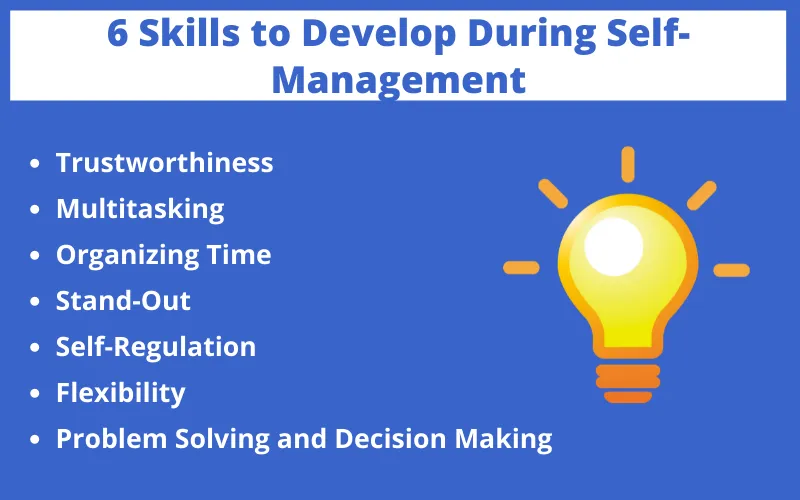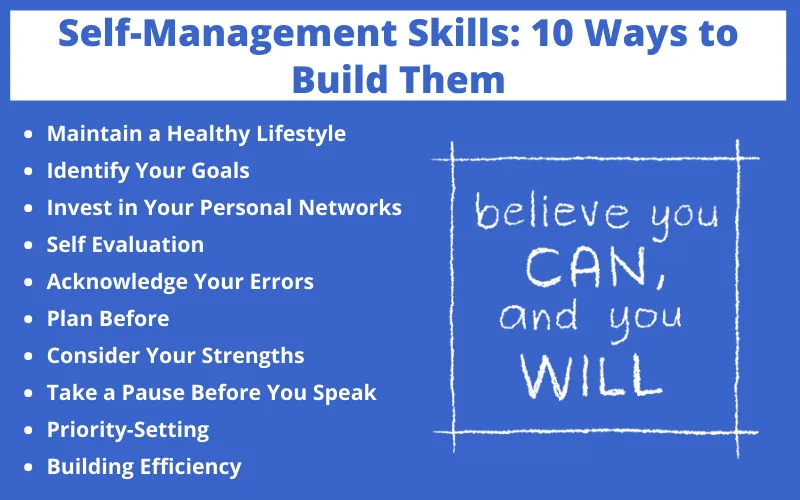10 Best Ways to Build Your Self-Management Skills
10 Best Ways to Build Your Self-Management Skills
Self-management, the term is simple. It involves our ability to manage how we act, think, and feel consciously and productively.
At work, self-management means managing your workload and productivity independently without your supervisor assisting, managing, or reminding your tasks.
Your career development can be positively impacted by developing your self-management skills.
Being an adult and managing your financial and personal affairs is part of self-management, and you probably have experience with self-management in your personal life.
It comes naturally to everyone. Some folks, however, lack this experience. You can learn self-management skills, and they are improvable.
Having strong self-management skills means knowing what to do and how to react in various situations.
They can control their anger, avoid distractions when they focus on their tasks and stay productive. Their actions follow their plan.
Why is Self-Management Necessary?
Self-Management is a skill that sets you apart from others. Your skills determine whether your boss keeps or replaces you with someone loaded with more skills in the competitive job market.
While employers can choose from many job applications, they often look at employees who can’t keep track of their own time and do their work without being reminded as inappropriate for the company.
They seek people with a can-do attitude, who understand what needs to be done first find ways to make work easier for their clients and colleagues.
Also, managers prioritize employees with good self-management skills on important tasks and projects. Companies believe that staff with good attributes should have no problem finalizing deals with the clients and satisfying the clients.
Independent workers, employees, and freelancers will quickly discover that they cannot operate a successful business if they do not upgrade their self-management skills.
Rather than waiting for employers to come looking for you, you should teach yourself valuable self-supervision skills first; then, you will unfold a complete set of opportunities.
6 Skills to Develop During Self-Management

Self-management is an important skill that helps individuals keep organized in their daily and professional lives. Gaining success on both a personal and professional level requires self-management skills.
Here are a few characteristics that an employee must learn self-management skills.
Trustworthiness
When someone can rely on you for important tasks, you are preferable to them. So, becoming highly compatible is the best skill one can develop.
You prove to your supervisor that you can handle complex tasks with little or no self-managing supervision, making you more desirable to your hirers and employees.
If you are dependable, your manager can assign you more high-level tasks because he knows that you complete them in the given time frame and circumstances when they assign a task.
So, while you think of building self-management skills and techniques, you should harness compatibility, reliability, and trustworthiness.
Multitasking
Who wouldn’t love a multitasking individual? If you are a perfectionist and can perform multitasking, any company would ask you to join immediately.
So, juggling different tasks without being or showing stress is the best feature in an employee. It would help if you learned multitasking on your journey to learn self-managing techniques.
Organizing Time
Time management is a valuable thing in one’s life, and everyone loves you if you are a punctual one. You have work, family, friends, neighbors, etc., who want a fraction of your precious time.
Planning and prioritizing a perfect schedule to balance work, life, and relationships are the best skills one must absorb. The ability to manage your time well leads to efficiency and avoiding procrastination.
Stand-Out
Being ordinary is normal, but you have to have some amazing skills that distinguish you from others to become extraordinary. Being extraordinary means you have a light shining over your head.
When your manager looks for someone to look after a very important project, they’ll look at you. You can make a better case for advancement if you possess solid self-management skills when it is time to ask for a promotion.
Self-Regulation
Assume responsibility for each task, manage your energy, and make sure you can complete it. Stay in control and make sure you hold yourself accountable.
Regarding stress management, keeping your priorities straight allows you to avoid feeling overwhelmed.
Since you have a high level of emotional intelligence, you know that your emotions should not interfere with your work or interactions with your colleagues.
Flexibility
When you can easily adapt to any workspace and working criteria, you become more desirable to your owners.
Regardless of what issue may arise, you must tackle it with your adaptive skills and become confident enough in your decision-making to resolve it independently.
Adaptability is an important self-management feature that one should have.
Problem Solving and Decision Making
Almost everyone faces problems in life at some point. Only those who have accepted this as a fact can deal with it.
Despite how well you do or how perfectly you try to complete a task, you cannot avoid problems. Thus, you should train yourself to analyze the problem more effectively and make more informed decisions.
Good decision-making affects your everyday life positively when you are good at it.
Your productivity will increase tenfold when you make clear and effective decisions, and you will also be able to manage your time effectively.
Self-Management Skills: 10 Ways to Build Them

Maintain a Healthy Lifestyle
How can you work when you’re unhealthy? If you take sick leave very often, your employer will notice you.
Companies only keep employees who benefit them. So, when you seem less productive, it takes no time for them to hire your replacement.
Eating right and sleeping well helps people do their best work and become more productive. So, to ease stress, improve your lifestyle habits, and approach your daily schedule with fresh ideas.
Identify Your Goals
No one is more successful than the person who sets goals and accomplishes them. With a set of goals in mind, you know what you’re aiming for, whether working on a new project or advancing your career.
Maintain a record of your progress schedule time to talk to your supervisor.
Invest in Your Personal Networks
In every field of endeavor, relationships are essential. They make living life more enjoyable.
Therefore, it is important to have good friends, colleagues, and family members. Together, they help shape your personality. In times of need, people who have excellent interpersonal relations can be your saviors.
Being true to the people you choose and choosing the right people ensures a healthy personal network. This process can improve these characteristics, like being helpful, approachable, and accountable.
Self Evaluation
No one can be perfect. There is always room for improvement. To improve yourself, it is important to pay close attention to the process of achieving good values and work ethics.
Through evaluation, you can determine where you are on the path to improvement. When you feel the need for professional assistance, you should access it.
Knowing how to improve and what to improve can help you achieve self-management skills.
Acknowledge Your Errors
Our job as managers is to point out other people’s mistakes. Acknowledging your own mistakes is essential to self-management.
We’re afraid to own up when we’ve messed up, but if we ignore it, we’re impeding our ability to progress.
Recognize your mistake as soon as possible rather than avoid it. Proceed accordingly. Admitting failure can be the most challenging task for improving self-management skills.
With time, you’ll become more accustomed to this process. Admitting your failure allows you to grow.
Plan Before
Let’s say you have a meeting with a client tomorrow. The first thing you should keep in mind is becoming punctual. Do not make your clients wait when you take such a huge responsibility.
Punctuality is a habit, and you can build it yourself. Managing your routine, preparing any information you might need to bring, and preparing a set of questions to ask before meetings is a good habit.
Planning isn’t only important during meetings; you can plan your everyday tasks earlier.
Consider Your Strengths
You should know your best skills. Are you great in an IT team, a marketing and sales team, an accounting team, or others?
Please take a moment to consider what your best skills are and where you can apply them much effectively?
You can improve your career growth by understanding what you’re best at and focusing on becoming an expert in these areas.
Take a Pause Before You Speak
You can never take your word back. You cannot let your emotions and personal life problems interfere with your professional life.
Your speech, command, and response to any issue can make you stand up amongst the crowd.
So, consider thinking about what you will say before discussing a project with coworkers. You are less likely to make hurtful responses and be more likely to provide useful insight.
You can always find alternative ways to share your thoughts professionally and productively, even if you have critiques.
Priority-Setting
We must set priorities to achieve our goals now that we know what needs to be done. So, even if we have to deal with other demands, we can ensure the most important tasks and projects are completed.
To do this, communicate with stakeholders about pushing out less immediate projects.
Building Efficiency
Time management and efficiency go hand in hand. When you struggle to manage your time, you might consider whether you’re working efficiently. Think about how to take benefit of the systems and technology available to you.
It is sometimes simpler and more accurate to do things the old-fashioned way, but automation and technology can simplify research and data manipulation.
Ask your supervisor if there is a better way to do something or suggest a new process or technology that could improve a process.
Conclusion
We can all improve our self-management skills; however, some people are more adept at it than others. To get to the next management level or start your own business, you need the best self-management skills.
Additionally, in the competitive job market, the hirers will ask you to demonstrate your soft skills, technical knowledge, and experience when applying for jobs.
So, you will succeed if you continue to pursue the desire to improve, not thinking that these abilities are static.
For more interesting blogs, subscribe to the timeTracko blog.

 in Melbourne
in Melbourne 
 Employee Screen Monitoring Software
Employee Screen Monitoring Software App and Website Monitoring Software
App and Website Monitoring Software Time and Attendance Software
Time and Attendance Software Finance
Finance Banking
Banking Healthcare
Healthcare Lawyers
Lawyers Retail & ecommerce
Retail & ecommerce Knowledge base
Knowledge base Blogs
Blogs Installation Guide
Installation Guide FAQs
FAQs About
About Media Kit
Media Kit Contact us
Contact us